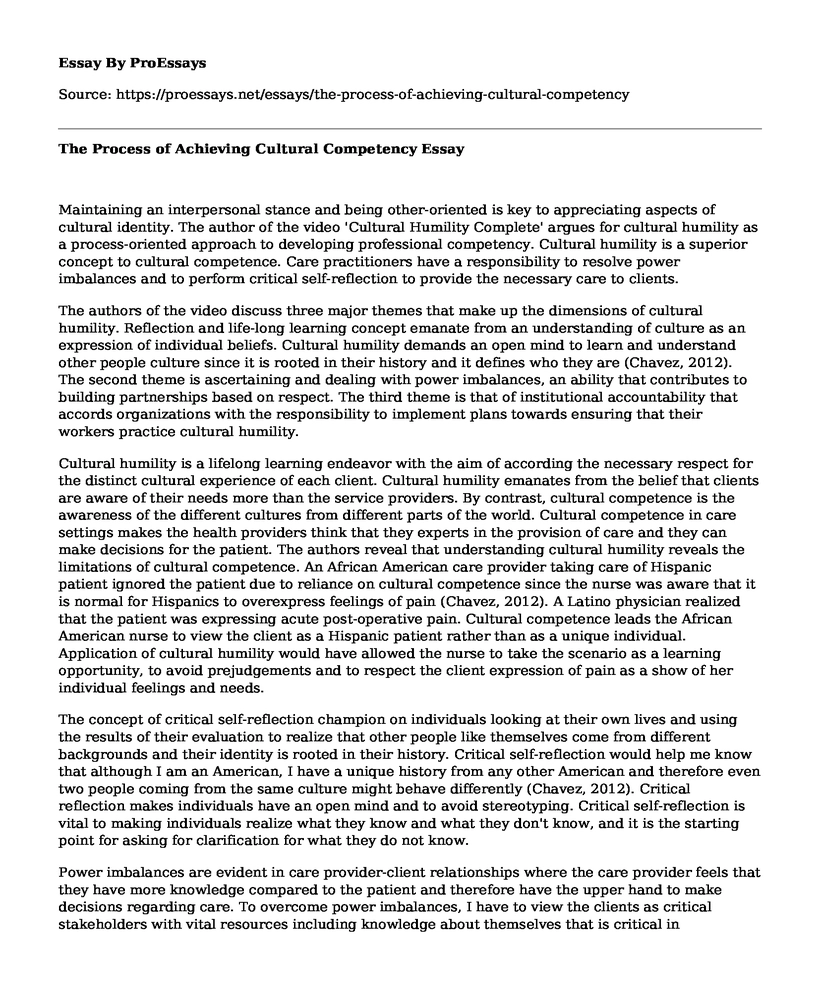Maintaining an interpersonal stance and being other-oriented is key to appreciating aspects of cultural identity. The author of the video 'Cultural Humility Complete' argues for cultural humility as a process-oriented approach to developing professional competency. Cultural humility is a superior concept to cultural competence. Care practitioners have a responsibility to resolve power imbalances and to perform critical self-reflection to provide the necessary care to clients.
The authors of the video discuss three major themes that make up the dimensions of cultural humility. Reflection and life-long learning concept emanate from an understanding of culture as an expression of individual beliefs. Cultural humility demands an open mind to learn and understand other people culture since it is rooted in their history and it defines who they are (Chavez, 2012). The second theme is ascertaining and dealing with power imbalances, an ability that contributes to building partnerships based on respect. The third theme is that of institutional accountability that accords organizations with the responsibility to implement plans towards ensuring that their workers practice cultural humility.
Cultural humility is a lifelong learning endeavor with the aim of according the necessary respect for the distinct cultural experience of each client. Cultural humility emanates from the belief that clients are aware of their needs more than the service providers. By contrast, cultural competence is the awareness of the different cultures from different parts of the world. Cultural competence in care settings makes the health providers think that they experts in the provision of care and they can make decisions for the patient. The authors reveal that understanding cultural humility reveals the limitations of cultural competence. An African American care provider taking care of Hispanic patient ignored the patient due to reliance on cultural competence since the nurse was aware that it is normal for Hispanics to overexpress feelings of pain (Chavez, 2012). A Latino physician realized that the patient was expressing acute post-operative pain. Cultural competence leads the African American nurse to view the client as a Hispanic patient rather than as a unique individual. Application of cultural humility would have allowed the nurse to take the scenario as a learning opportunity, to avoid prejudgements and to respect the client expression of pain as a show of her individual feelings and needs.
The concept of critical self-reflection champion on individuals looking at their own lives and using the results of their evaluation to realize that other people like themselves come from different backgrounds and their identity is rooted in their history. Critical self-reflection would help me know that although I am an American, I have a unique history from any other American and therefore even two people coming from the same culture might behave differently (Chavez, 2012). Critical reflection makes individuals have an open mind and to avoid stereotyping. Critical self-reflection is vital to making individuals realize what they know and what they don't know, and it is the starting point for asking for clarification for what they do not know.
Power imbalances are evident in care provider-client relationships where the care provider feels that they have more knowledge compared to the patient and therefore have the upper hand to make decisions regarding care. To overcome power imbalances, I have to view the clients as critical stakeholders with vital resources including knowledge about themselves that is critical in determining the outcome of care (Chavez, 2012). Recognizing that each client has something to offer assists in realizing the value of that client. I will solve power imbalances in care settings while I value partnerships with clients since I may know the cause and effect of their troubling experiences but clients have immense knowledge about their preferences and personal history.Conclusion
To sum up, the increase in multiracial populations call upon care providers to uphold cultural diversity in their practice. Multiculturalism is a complex phenomenon and psychologist have to understand cultural competency as more of a process and not as an end product. Cultural humility demands seeking factual knowledge, and it involves an ongoing process by individuals with the aim of understanding the attitudes they have both towards themselves and towards others.
References
Chavez, V. (2012). Cultural Humility (Complete). YouTube
Cite this page
The Process of Achieving Cultural Competency. (2022, Mar 11). Retrieved from https://proessays.net/essays/the-process-of-achieving-cultural-competency
If you are the original author of this essay and no longer wish to have it published on the ProEssays website, please click below to request its removal:
- History of Christianity in Kapu Research
- Essay on Transitioning to Parenthood
- Essay Example on Work-Life Balance: A Stressful Reality for Working Mothers
- Essay Example on Advertising and Pop Culture: A Positive Influence on Consumers
- Paper Example on Japanese Imperium: Selfishness Over Diplomacy in East Asia
- Research Paper Sample on Servicemen and Their Families: Challenges and Trauma
- Child Maltreatment - Report Sample







